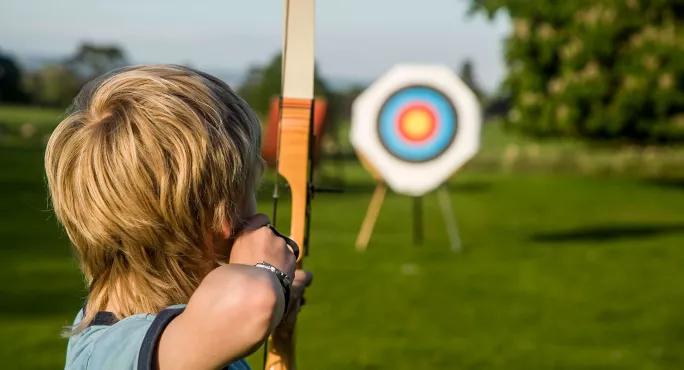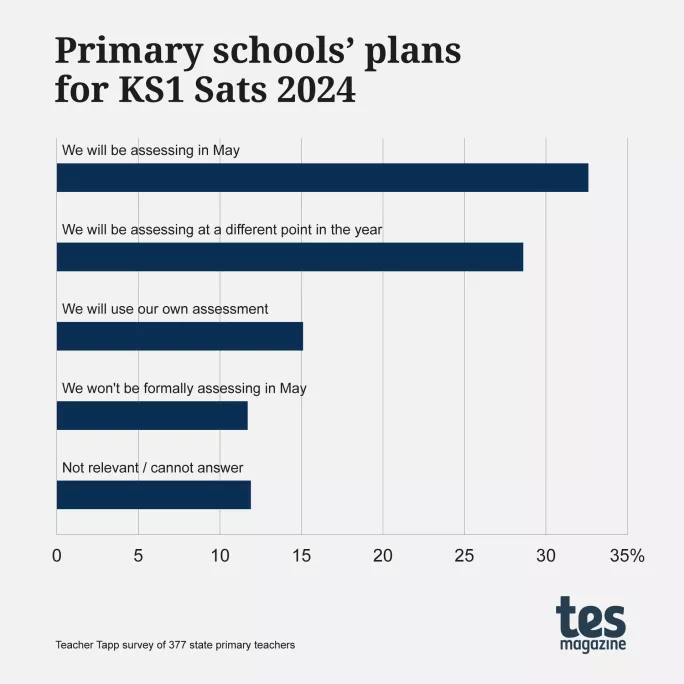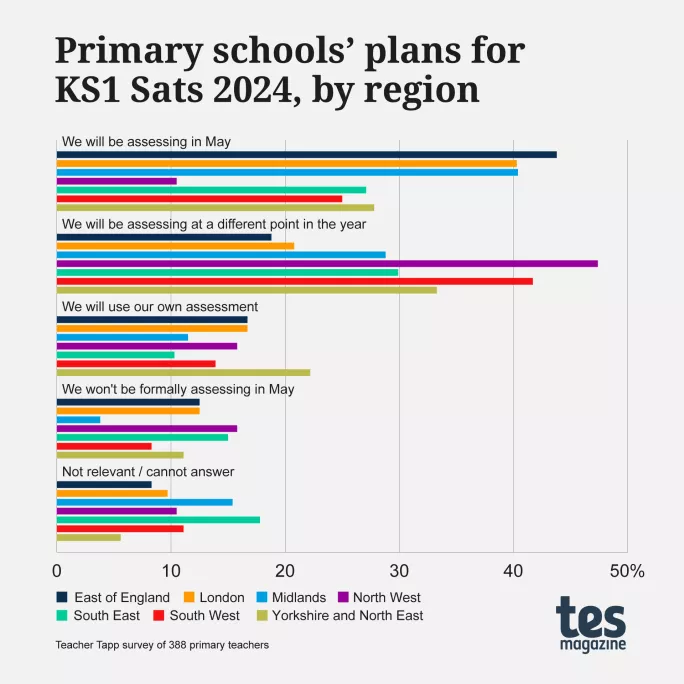Most teachers running key stage 1 Sats this year

Over half of primary schools are planning to run key stage 1 Sats this term despite the government scrapping the mandatory tests last year, according to a representative survey.
A third of primary teachers (33 per cent) who responded to a survey run by Teacher Tapp for Tes said they will be carrying out the assessment next month as had previously been required.
The tests were made optional by the Department for Education in 2023 amid concerns over ”anxiety” among young children.
A further 28 per cent of respondents said they will run the assessments for Year 2 pupils at a different point in this academic year.

KS1 Sats were scrapped in favour of the Reception Baseline Assessment and became optional in September 2023, with the DfE still sharing the free tests with schools.
However, while schools do not have to run the tests or share pupil data with the government and parents, many primary school teachers said their schools are opting to continue using them over their own assessments.
When primary school teachers were asked by Teacher Tapp why they were carrying out the assessments, the most common answer was for benchmarking purposes.
“It’s a known benchmark for where pupils are at,” one primary teacher said. “Coupled with teacher assessment, it will provide a useful in-school comparison to prior cohorts.”
- Optional KS1 Sats: What schools need to know
- Background: Decision to scrap Sats from 2023 ‘welcome’
- Sats 2024: Key dates and information
However, James Bowen, assistant general secretary of the NAHT school leaders’ union, said while KS1 Sats can be useful in benchmarking, it is important to remember that there is no obligation for schools to use the papers this year.
Mr Bowen, who previously lobbied the government as part of the union’s push to remove the tests, urged schools to take this “perfect opportunity to move away from a government-led assessment system to one that really works for them and their pupils”.
Teachers at multi-academy trusts (MATs) were slightly more likely to report they were running the DfE tests, with over a third (36 per cent) of those who responded to the survey indicating they will be carrying out KS1 Sats.
This is compared with 31 per cent of staff at maintained schools and 30 per cent of single-academy trusts.
‘Reliable benchmarking tool’
KS1 Sats provides a “reliable internal assessment and benchmarking tool across the trust for our schools”, said Andrew Rigby, national education director of REAch2, where all 60 primary schools within the MAT plan to run the tests.
While Mr Rigby supported the tests becoming optional last autumn, he says that using them as an “internal assessment tool, rather than for external accountability”, has helped to reduce workload for primary schools within the trust, which is the country’s biggest primary-only MAT.
Simon Cowley, interim co-CEO of The White Horse Federation, said: “This year we have asked all schools to administer the KS1 SATs, with the vast majority of headteachers in favour of continuing with the assessments to support our pupils’ preparation for KS2. We will review our assessment policy at the end of this year to finalise our approach for September 2024 onwards.”
Vince Green, CEO, Summit Learning Trust, said in-school assessments are a very effective tool to check on pupils’ progress and ensure they are well prepared for their next phase of education.
He added: “Our principals and leaders decided some time ago that we would make use of this year’s Key Stage 1 SATs materials with our children next month.” He told Tes these assessments would be “handled very sensitively, in an age-appropriate way” and be used to help to target specific support to pupils.
Tiffnie Harris, primary and data expert at the Association of School and College Leaders (ASCL), echoed the usefulness of Sats in both “helping schools to check on how well children are doing” and “identifying where extra support may be needed as part of their own tracking”.

However, some trusts have opted to run them at a different point in the year; 24 per cent of MAT teachers who responded to the survey said their school will be testing Year 2 at a different point in the year.
While 31 per cent of maintained school teachers said they would run Sats at a later date.
Lee Mason-Ellis, CEO of The Pioneer Academy, which has 17 primary schools across London, said: “It was felt that delivering the test slightly later and without any additional pressure would ensure consistency and help assess progress.”
He added that the trust is investigating new assessment procedures instead of the KS1 tests at the end of the year.
Additional workload for schools
Just 15 per cent of primary teachers who responded to the Teacher Tapp survey said they would be running their own assessments.
The “extra effort and cost of copying doesn’t provide enough useful assessment information”, one primary school teacher told Teacher Tapp, with another adding that using internal assessments helps “keep analysis consistent”.
However, creating tests and answers has an “additional workload for schools”, ASCL’s Ms Harris said, and added that, unlike government tests, “there is no real benchmark to measure against”.
She recommends using DfE tests alongside other information to get a more “well-rounded view” of pupils’ progress.
Changes needed to primary assessment system
Dominic Wyse, professor of early childhood and primary education at UCL Institute of Education, said he is “not surprised” by the number of schools still using the tests as the current education system ”so strongly, and continues to so strongly, requires statutory assessments”.
“Change doesn’t come quickly, as teachers and schools have to develop new ways of working,” he added.
Professor Wyse co-authored the Independent Commission on Assessment in Primary Education report in 2022, which found that 90 per cent of educators disagreed with the current system of primary assessment.
“We need a new government to look very carefully at the statutory assessment systems in primary schools and make some significant changes,” Professor Wyse added.
“Until this happens, although I’m sure schools will continue to innovate in relation to KS1 assessments, I don’t think the necessary changes can happen because the school accountability systems are too entrenched, and they have led to deskilling of teachers.”
Faith in teachers’ benchmarking ability
Just one in 10 respondents (12 per cent) said that they will not be running tests at all, with the most common reason being that the testing does not tell them anything they do not already know about their pupils.
One respondent also said that “the children are too young to be tested”.
Rachael Howell, CEO of Stour Academy Trust, told Tes that her trust will not be running KS1 Sats in any of its eight Kent-based primaries.
“We have every faith in our teachers’ ability to assess children’s progress and attainment,” Ms Howell said, who is instead opting to use internal assessment to address gaps in learning.
“Children of seven don’t always perform predictably in tests, so we relied on teacher assessments anyway as there was often a discrepancy between the two,” she added.
Teachers feel ‘powerless’ without government tests
Concerns about testing seven-year-olds were voiced at the recent NEU teaching union annual conference, with one delegate proposing that KS1 tests be phased out.
“Teachers are still doing them because they often feel powerless with nothing to lean on,” said Yasmine Talebian, a special educational needs teacher in West Sussex. “We should not be doing them, full stop.”
More Than A Score, a group that campaigns against primary assessment, called the DfE’s decision to send KS1 test papers to schools unless they have opted out “an enormous waste of money” and “demonstrates a fundamental lack of trust in teachers”.
According to government guidance, maintained schools and academies will receive paper copies of the KS1 papers for all subjects unless they decline the tests.
DfE tests ‘do not help learning’
A spokesperson for More Than A Score said: “Year 2 teachers know their pupils best and carry out their own in-class assessments to help their progress and keep parents informed.
“Government test papers do not help learning and may end up putting both children and teachers under unnecessary pressure.”
The government plans to publish scaled score conversation tables, which will include the mark required to achieve the expected standard for the optional KS1 tests.
The tables will be available to schools on the Primary Assessment Gateway from 16 May and then on the government website from 3 June.
For the latest education news and analysis delivered directly to your inbox every weekday morning, sign up to the Tes Daily newsletter
You need a Tes subscription to read this article
Subscribe now to read this article and get other subscriber-only content:
- Unlimited access to all Tes magazine content
- Exclusive subscriber-only stories
- Award-winning email newsletters
Already a subscriber? Log in
You need a subscription to read this article
Subscribe now to read this article and get other subscriber-only content, including:
- Unlimited access to all Tes magazine content
- Exclusive subscriber-only stories
- Award-winning email newsletters
topics in this article



